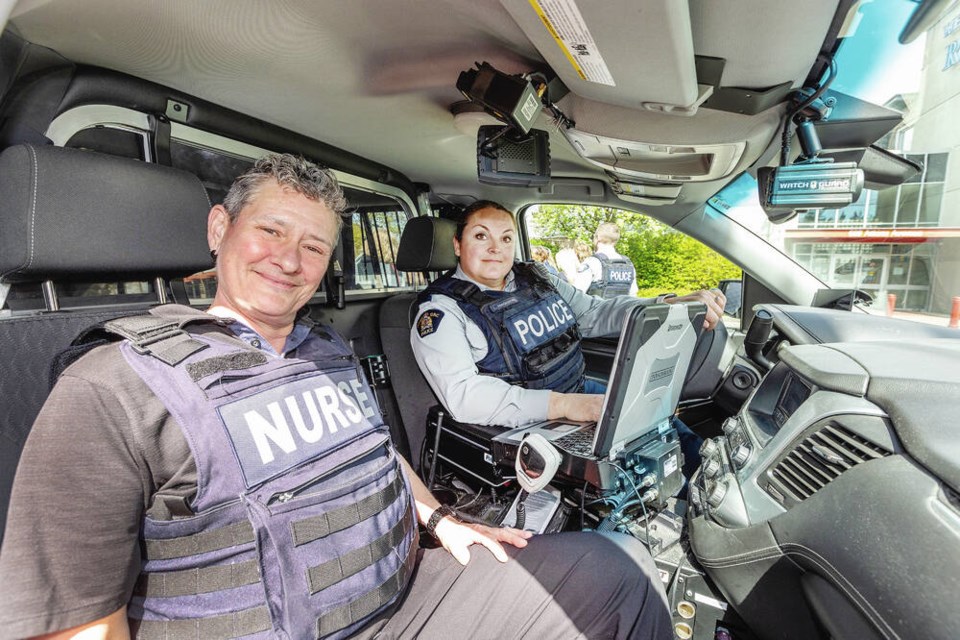Const. Benje Bartley brings a unique background to his new role as a member of the West Shore RCMP Mental Health Unit.
Before he was a police officer, he was a pastor, and helping people deal with personal issues was an important part of the job — just as it is now.
“I’ve always had an interest in helping people who were in crisis,” Bartley said. “It has always been a passion of mine.”
Bartley is one of three officers and two nurses assigned to the unit’s mobile integrated crisis response team, which was announced last July and had a partial launch in February.
Full staffing was finalized this month, and a public launch was held this week at the West Shore RCMP detachment in Langford. The team receives $375,000 a year in provincial funding.
Two-person teams — an officer and a nurse — respond to calls in an unmarked police vehicle. The officers wear regular uniforms, but the detachment has proposed to RCMP headquarters having members work in plainclothes.
Registered nurse Shea MacKenzie, another member of the team, brings years of experience in mental-health and addictions work to her role.
She said she knows two people on a similar unit in Victoria, and jumped at the chance to be part of the new unit on the West Shore. “I thought this is what I need to do,” she said. “I’ve been wanting to do this job forever.”
Cpl. Lauren Ferguson, who leads the new unit, said she can recall several calls in the past few months where a youth in crisis was assessed in their own living room.
“We were able to follow up with them and their family by providing referrals to appropriate resources. Without the medical knowledge of the nurse, these calls may have resulted in an apprehension, thus creating further distress for the youth.”
Bartley said every mental-health call is different. “On the surface they may look the same — a suicidal person or someone causing a disturbance — but until we get there we really don’t know what the person needs.”
There is also a larger goal, Bartley said: to break down the stigma of mental-health issues and crisis.
Mental-health calls for West Shore RCMP have been increasing every year — the detachment has seen a 39 per cent jump in such calls since 2018 — from 1,163 that year to 1,622 in 2022.
From January to April 25 this year, the detachment received 500 calls for service with a mental-health component, out of a total of about 8,000 calls, said Cpl. Nancy Saggar.
The mobile integrated crisis response team attended 270 of those 500 calls — just over half.
Only 39 of the calls, or 14 per cent, resulted in apprehensions under the Mental Health Act. That’s down from 2023, when 19 per cent of 1,788 calls related to mental health led to such apprehensions.
The new unit covers calls seven days a week from 10:30 a.m.-10 p.m. — the peak period for policing demand, Saggar said.
Mackenzie and fellow nurse Daniel Nguyen assess those needing help and work with officers to deal with each situation — whether the situation can be handled in relatively short order or takes several hours.
They also do triage to determine the order in which cases are dealt with.
The unit is co-ordinated by Island Health and supported by local governments. Langford Mayor Scott Goodmanson, Colwood Mayor Doug Kobayashi and Metchosin Mayor Marie-Térèse Little all attended the public launch, along with various other council members.
Goodmanson noted that Langford, Colwood, Metchosin, View Royal, Highlands and the Songhees and Esquimalt First Nations share the services provided by West Shore RCMP.
Langford-Juan de Fuca MLA Ravi Parmar said similar units are in place in other communities around –°¿∂ ”∆µ and the province has plans for more.
Asked what he would see as a successful resolution to a call, Nguyen said a positive outcome would be “every time someone can heal and recover at home, if they can get past their crisis and continue to function within our community.
“And if they feel that they have supports, they feel that they have an avenue to navigate the system and be able to continue their journey to recover.”



